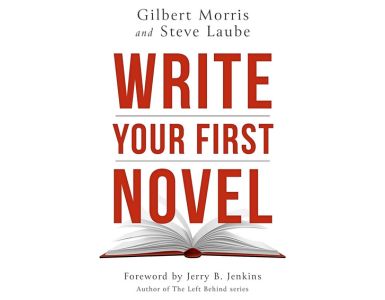The Steve Laube Agency is committed to providing top quality guidance to authors and speakers. Our years of experience and success brings a unique service to our clients. We focus primarily in the Christian marketplace and have put together an outstanding gallery of authors and speakers whose books continue to make an impact throughout the world.
Our Service Philosophy

Content
To help the author develop and create the best book possible. Material that has both commercial appeal and long-term value.

Career
To help the author determine the next best step in their writing career. Giving counsel regarding the subtleties of the marketplace as well as the realities of the publishing community.

Contract
To help the author secure the best possible contract. One that partners with the best strategic publisher and one that is mutually beneficial for all parties involved.
Recent Posts
How to Write Your First Novel – an Interview
Thomas Umstattd Jr. interviews Steve Laube
Thomas: So, you’re thinking about writing a novel. You’ve tried your hand at writing a few times, but the story just hasn’t come together. Or maybe you wrote and wrote, but you didn’t quite like what you wrote.
The method of starting to write and hoping for the best is the hardest way to write a novel. It’s like trying to drive to Topeka, Kansas, without a GPS or even a map. Saying, “I’ll just drive around and figure it out as I go,” may just take you in the wrong direction and is less likely to take you in the right direction.
Every work of fiction contains certain essential elements that make the story work. Regardless of what genre you write, if you don’t get those principles correct, your novel will fail. Thousands of fiction writers have applied these principles to their writing in order to become bestselling authors.
Think of these principles as a map to success. Once you have the map, the beginning of your journey can be much more successful.
What are the essential principles of writing a novel?
I asked Steve Laube, who has over 40 years of experience in book publishing, bookselling, and book writing. He’s president emeritus of the Christian Writers Institute, publisher of the Christian Writers Market Guide, publisher of Enclave Publishing, and president and founder of The Steve Laube Agency.
How should you start writing a novel?
Thomas: What’s your advice for somebody who has a blank Word document in front of them?
Steve: The fear of that blank page is real. The challenge for all novelists is to figure out whether your story can last for 100,000 words. Many people have a story they tell their children at bedtime, but they won’t be talking for eight hours. They’ll tell their story briefly. The question is whether that story can be extended and sustained for eight hours.
What makes it a book-length story?
Steve: Short stories are fine. They’re more challenging from a commercial viability standpoint, but your first objective is trying to figure out “What is your story?”
Thomas: Let’s say I have an idea for a novel. I have an interesting character. How can I tell if this idea is good enough to hold that story? How do I know if people would want to spend 100,000 words with my character?
Steve: Well, that’s the big question, isn’t it? The character might be interesting to you, but is it interesting to someone else? The way to find out is to start writing it.
You can have an idea in your head but still have no idea where to start. I have talked to many writers over the years who have an idea or were told they should be a writer. In either case, they’ll come to a writers conference and sit down with me, but they have no idea where to start or how to flesh out a character.
I created this book called Write Your First Novel (affiliate link), which I coauthored with Gilbert Morris; and we start with the plot. Character comes later. Your characters need a place where they live; and when that is set, you can start putting your action figures into the story.
After that, you need to determine how your characters will sound different on paper. Ask yourself whether you can differentiate between the characters’ voices. What aspect of their character development or quirks make them different and unique?
To start telling a story, you must figure out who your protagonist is. You need to determine who’s good, who’s bad, or a mixture there unto. Then, decide whether the characters or the plot will drive the story.
What’s a protagonist?
Thomas: Many of us learned that the protagonist is the hero of the story, but not all protagonists are heroes. In recently published books, we have a lot of antiheroes and villains who are protagonists.
So, what is a protagonist?
A protagonist is a character who makes decisions that move the plot forward. In fact, I’ve even heard this turned into a verb: protagging. In the real world you might need to start protagging on a project. If your boss needs a report right away, you need to start protagging and making decisions that move the plot forward and have a meaningful impact on the story.
Steve: Technically, the protagonist is the main character. You can have one or maybe two protagonists, but no more than that.
Thomas: Just because a writing master wrote a story with a dozen protagonists doesn’t mean you should. That book probably wasn’t that writer’s first book; and certainly, you should not have a bunch of protagonists in your first book.
Learn how to tell a good story with one protagonist and one antagonist.
The antagonist is the thing inhibiting the protagonist. It doesn’t have to be another character. It could be nature, God, society, or any of the other classic forms of conflict. The protagonist is the main character who’s moving the story forward.
If I have the beginnings of a plot, how do I flesh it out?
Thomas: Do I have to write the whole book to figure out what my plot is, or is there a faster method?
Steve: There are all sorts of methods. I once worked with a writer who wanted to have a brainstorming session with the publisher to plot out their story. It was an unusual situation, but we managed to get everyone in the same room for an entire day.
We started with a whiteboard, mapping out where the story would begin and end. The challenge was to figure out the journey between those two points. To do this, we wrote each major scene or action on an index card without numbering them.
Using a long conference table, we laid out the index cards, each representing a scene or significant moment. Then we started “shuffling the deck,” so to speak, asking ourselves questions like:
- “If this action happens here, what implications does it have later?”
- “How do we logically connect this scene to the next?”
For example, if a character needed to travel from the store to a mountain, we had to decide how they got there. Did they walk? Bike? Take a bus or taxi? Fly? Once that decision was made, we asked if anything significant happened during the journey. If it did, we added another index card to reflect it.
By the end of the day, we had a massive stack of index cards. Once we were confident in the structure, we numbered them to create a sequential plotline. Essentially, the author walked away with a “paint-by-numbers” guide for their story. They knew exactly how each scene would unfold and lead to the next.
While this method can be highly organized and effective, it comes with risks. For one, if someone sneezed, all those cards could be scrambled. Plus, adding new scenes as you go can cause the story to blow up in size.
This approach is essentially a form of outlining; and while it works well for some writers, there are many other methods for plotting a story.
I have a client who’s been working on an epic novel for approximately a decade, and the last draft is close to 700,000 words.
This writer writes in an organic way as opposed to a linear way. She writes whatever story or scene is on her mind that day. One day, she might write scene number 720 and scene number 430 the next day. She ends up with a seemingly chaotic structure, but as she begins putting it together, the word count balloons.
I don’t necessarily recommend that, but that’s her method. She’s written multiple epic novels that way.
How do I know what to cut?
Another writer I know wrote a 250,000-word novel and went back and cut what didn’t belong. She ended up with an 85,000-word novel that was very successful and won many awards. She started with what she called the “glump.” As she edited, she asked herself whether readers would care about that particular scene. Did it move the story forward? It may have been interesting to research and write, but if it didn’t have anything to do with the story, she cut it.
Thomas: The creators of South Park gave a helpful rubric for determining what to keep and cut. They said, “If you’re using the phrase and then, you can cut everything after that.” Look for scenes that start with either but or therefore. Both words indicate that something happened, and things are moving in a different direction. You want to demonstrate clear causality from one scene to the next.
If you just have a bunch of and thens, there’s no connection; and it’s often a sign of a scene that can be cut because it’s not being caused by the preceding scene.
We live in a world where doers do deeds, and those deeds influence the world around them. Especially in fiction, people want to read about protagonists whose decisions matter.
How do you create characters readers care about?
Steve: Your reader needs to care about the character. There has to be an emotional connection that draws the reader in, making them genuinely interested in what happens to this person. Without that connection, the story creates a disconnect; and the reader gets bored
Even if there’s plenty of action, it won’t matter if the reader doesn’t care about the character experiencing it. That emotional connection makes stories memorable.
However, sometimes it depends on your genre. You might remember the thrill of a thriller because that’s what the whole story was about. The characters were just pulled along by the adventure.
In other stories, the character is the most memorable element. For example, it’s probably been 30 years since I read A Prayer for Owen Meany by John Irving. I remember the character, but I could not tell you the storyline for the life of me. That character was painted so brilliantly in my head that I can almost picture him.
That’s what makes literature eternal in this day of disposable stories we read and toss into the Goodwill pile or delete from our Kindles. Some stories make such a special impact that you decide to keep them on your shelf.
Thomas: By contrast, if you use a lot of cheap tricks in your story, readers will be less likely to reread it. The more effective your foreshadowing, the more enjoyable your story becomes, even on a second read. Good foreshadowing allows readers to appreciate the hints and connections they might have missed the first time.
On the other hand, if your story relies heavily on subversion, rug-pulling, or big twists, it can lose its impact on subsequent reads. Once the reader knows the twist, the story often becomes less engaging.
My six-year-old daughter and I recently listened to The Hobbit together. The Hobbit is simpler than The Lord of the Rings because it’s very episodic. Each story is its own contained narrative, which makes it a bit more digestible for a young child. As I listened to it again, I enjoyed it just as much as I had the other times I’d read it. It’s a true classic in that way.
How do you write a book that becomes a classic?
Thomas: Part of writing is knowing whether you’re trying to write a classic. Writing a classic is harder, and it narrows the choices you can make about your story.
If you’re trying to write a pop bestseller, it’s much more important that you’re in tune with the cultural zeitgeist. What’s popular now won’t be popular in ten years, whereas classics maintain their popularity over time.
Steve: I recommend that most writers, and especially beginning writers, try to divest their dreams of writing a classic, because it probably won’t happen the first time.
If you ever have the opportunity to sit with a successful author, ask them how many manuscripts they have either in their drawer or stuck on their computer that will never see the light of day. Stephen King has five books that have never been published. He talks about them in his book on writing, and he calls them “practice.”
He tried to get them published; and he received many accolades and good reviews from editors, saying, “You’re a really good writer, but this story doesn’t work.” It wasn’t until his sixth story that he truly made a mark. The irony is that those first five books were not horror.
He was learning how to write, and it was practice.
How do I begin to practice writing?
Steve: Don’t tell yourself, “I’m going to write someday,” because that day will never come. If you think you’re going to write it someday, you never will. So, get to work on it. It’s going to be hard. You’ll slog through it, you’ll hate it at times, and you might feel like throwing it across the room. Your characters will start doing things you didn’t plan because they seem to take on a life of their own, and all sorts of unexpected things will happen. But that’s all part of the process of learning how to write a novel.
Thomas: Returning to my metaphor about driving to Topeka, Kansas, remember that before you can take that drive or even use a map effectively, you first need to learn how to drive a car. Learning to drive is like taking a road trip in some ways, but it’s also very different. It often begins with driving in circles in a parking lot, going nowhere in particular. It takes patience, practice, and time spent driving purely for the sake of learning, not to reach any specific place on the map.
When my dad taught me to drive, we went out to the Hill Country west of Austin in an old, manual-transmission truck that felt like it was held together with bailing wire and duct tape. He had me practice on those hills, which was hard. But once I learned how to drive on those hills, I felt far more confident driving anywhere else.
In the same way, you don’t need to start writing your novel right away or have it all figured out before you begin. Instead, try writing some short stories, not for publication or income, but simply to practice and build your skills.
There’s not a lot of money in short stories; but at the beginning of your career, a short story is a great way to practice creating a character. Write a short story for your character and add some obstacles and an antagonist. Then, determine whether you want to spend more time with that character.
A short story is a great place to practice making your characters distinct from each other by the way they talk and act.
Plus, it’s much easier to get feedback on a short story. Asking somebody to give feedback on your novel is like asking somebody to clean your garage. It’s a day-long project. It’s a big ask. But asking somebody to give you feedback on a short story is like asking somebody to bring you a meal when you’re sick. It’s doable, and it’s a favor you can return.
You’re not cleaning each other’s garages unless you’re really good friends.
When you ask for feedback on a short story, you can ask, “Do these characters sound different?” “Did I do a good job differentiating these characters?”
Those questions can help improve your driving, so to speak. When it’s time to drive to Topeka, you can pay attention to the map, rather than trying to figure out what gear your car is in.
How does dialogue help with characterization?
Steve: One of the first subjects covered in Write Your First Novel is creating the character. Your character is a person and needs to have a distinctiveness about them. Creating a character is one thing, but creating their dialogue is another. It takes a lot of skill.
What I find so fascinating about novels is how vivid, distinctive, and interesting characters can make a story come alive. There are those characters you love to see walking into the room because you know they’ll make you laugh. It’s like the people in your real life who light up a room by entering and making an offhand comment.
You can create that same effect in a novel through dialogue. The character and their dialogue are two separate elements; but when they come together, they form a complete and essential part of the story.
Thomas: We have an episode with Angela Hunt about writing good dialogue.
One excellent example of distinct and memorable dialogue is found in Bram Stoker’s Dracula, which I recently read. It’s a surprisingly Christian novel, and each character’s dialogue is so unique that you can often tell who is speaking without Stoker explicitly saying so. This is achieved through distinct character traits and the way they speak.
Let me give you three examples:
- Jonathan Harker: As a British lawyer, Harker uses sophisticated and polished language. His English is always grammatically perfect, which reflects his education and professionalism.
- Quincy Morris: As a wealthy Texan, Morris is full of colloquialisms and slang. His dialogue is casual and distinctly American, which stands out in the formal Victorian setting. Interestingly, during this era, slang was somewhat controversial; and one of the other characters even remarks on it.
- Van Helsing: He is perhaps the most intriguing character. Van Helsing is a highly educated Dutchman with two or three PhDs. While he uses complex, precise “big” words, his sentences are often grammatically incorrect because English is his second language. He gets small words wrong, occasionally using words in the wrong order and using unconventional constructions like “Friend Jonathan.” This broken, yet sophisticated, style distinguishes Van Helsing’s dialogue and makes him incredibly compelling.
If you were to run Van Helsing’s dialogue through a tool like Grammarly, it would flag it all as incorrect. But those “mistakes” are intentional. They reflect his unique voice and make him stand out as a character.
This attention to dialogue is part of what makes Dracula such a timeless and fascinating novel. Even if you haven’t read it, you’ve likely heard of Van Helsing. If you haven’t read Dracula yet, I highly recommend it. I think it’s the only Christian horror ever written because Christian horror is not a real genre, as Steve would be happy to explain; but Dracula does it right.
What are some mistakes people make with dialogue?
Steve: You need to be careful with your use of slang for a couple of reasons.
First, slang can date your book really fast, especially if you’re writing a contemporary novel. You also have the problem of using modern colloquialisms in an older book that don’t fit the era. I just read a historical novel based in the third century, and the author used wording that didn’t fit. It made me wonder why the editor didn’t catch it.
Second, you must consider the sensitivity of different cultures. It’s easy to create a caricature of a non-English speaker inappropriately, so you must be careful and sensitive to that.
Many years ago, I read a terribly written Christian novel. I don’t know how it got published. The character fell in and out of dialect in their dialogue. In one scene, they’re speaking English fine. The next scene used broken English. It made absolutely no sense, but it was also insulting. It insulted me as the reader. It also insulted the character, and the character became a caricature.
Thomas: If you’re writing a modern book, I would steer clear from dialect because the dialects are going away. Mainstream media has been around for 80 years. In the United States, there’s an accepted English that the major networks use, and most of the characters speak this accepted English. It’s so dominant that it’s starting to obliterate regional dialects in places like the United Kingdom and Australia.
Steve: It’s also important to understand the difference between a dialect and an accent. People can still speak perfectly clear English with a regional accent.
Where does historical research fall in the process of writing a novel?
Thomas: Don’t worry too much about nailing every historical detail in your first draft. Obsessing over accuracy at that stage can be paralyzing and lead to spending all your time researching instead of writing. Focus on getting the story down first. Later, you can ask your nerdiest history-loving friend to review your draft and help fix inaccuracies.
One of the big shifts in writing over the past century is how much the process has changed because of technology. In the days of quill pens and expensive paper, your first draft had to be fairly polished. Reducing the number of revisions was practical and necessary to save time and money.
Now, with modern word processors, the process is different. You can write freely, experiment, and produce a rough first draft without worrying about the cost of revisions. Editing on a computer is quick and easy. You can quickly delete, rearrange, and rewrite.
This shift has given rise to discovery writing, which likely didn’t exist in the days of quill pens. Writers back then relied heavily on detailed outlining and extensive planning, and those methods still work just as well today. However, with word processors, you now have the flexibility to write a rough first draft, even if only 10% of it ends up in the final book.
It’s more important to keep writing than to aim for perfection in your first draft.
How can I keep from getting derailed by my research?
Steve: One of my clients used to get completely buried in the weeds of historical data and details while he was writing. He was so fascinated by it that he’d often end up going down endless rabbit holes.
In his later books, he realized he needed a different approach. When he started his research, he went to the children’s section of the library. There, he focused on the basics of the timeline, major characters, and key facts. Then, he wrote his draft.
After finishing the draft, he went back to figure out where the extra details needed to be added to the story. It completely changed the way he approached researching and writing historical novels.
Thomas: Another trick is to use brackets. All word processors have a find and replace feature. By pressing command+F or control+F, you’ll get a little search engine for your own document.
As you’re writing, you might find you need the name of a city in Bavaria, but instead of going down that research rabbit hole, you simply write in brackets [find appropriate city name].
In the afternoon, after you’ve had lunch that had too many carbs and writing feels difficult, search your document with command+F and look for a bracket. You’ll find some assignments your past self has given your present self, and you can now search for a city in Bavaria.
When you are writing the first draft, don’t let the research pull you out of writing mode. Keep writing the story when you’re in the zone. It’s too easy to fall out of the zone, so the zone must be protected. When you’re in what scientists would call a “flow state,” you’re doing your fastest and best writing.
You can learn more about writing in a flow state in my interview with Chris Fox. He gives tricks and techniques to help you get into that flow state.
What if I just can’t get started writing?
Thomas: For some authors, their biggest challenge to doing the work is fear. They want to write, but part of them doesn’t want to write, so they come up with excuses. We’ve invented this idea of writer’s block, but it’s not real. There’s no such thing as plumber’s block or politician’s block. People with jobs in the real world have to do their work whether they’re “feeling it” or not.
There’s a great story about a pastor who once stood up to give a sermon and said, “God didn’t give me anything today. I don’t have a sermon for you.” The elders took him aside after the service; and from that point on, every Sunday, he had a sermon prepared. Somehow, God always seemed to speak to him after that. When you have to give a sermon, you’ll find something to preach about.
The same principle applies to writing. I don’t believe in writer’s block. Sure, you can be in or out of the zone, but you don’t have to be in the zone to write. Writing when you’re not in the flow is harder, but it’s entirely possible. You just have to do the work.
What advice do you have for authors struggling with fear and motivation?
Steve: Getting rid of fear is very personal, so I can’t give an answer for that. You might begin by asking what you are afraid of. If you’re afraid of failure, welcome to the club. We’ve all been paralyzed by that.
There’s also the paralysis of analysis, where you think about it so much that you simply stop yourself from doing it.
In Dune, one character says, “Fear is the great mind-killer.” You just have to work your way through it.
No one knows you’re writing, so there’s nothing to be afraid of. It’s a very solitary experience. You fear the rejection of someone saying you don’t have what it takes.
I know one writer who stopped writing for five years after being told at a writers conference that she wasn’t a Hemingway and she wasn’t good enough. Unfortunately, she believed that person. I want to take that person aside and give them a harsh talking-to because that kind of statement is not helpful.
That author has now written 17 novels.
You can tell an author, “This needs a lot of work”; and they’ll usually ask, “Like what?” At that point, you can have a teaching moment.
The fear of rejection, the fear of not having what it takes, or the fear of not being able to finish is all very real. Of course, you can’t finish it if you don’t work at it.
It’s easy for me to say, “Just get started.” But I understand it’s not that simple. You likely have a busy life with a day job, family responsibilities, children, and other priorities that will always come first, as they should.
But some may need to ask, “Why am I feeling led to write? Why am I being called to write? What is the point?” Try to focus on why you’re here and why this desire has been given to you.
Calvin Miller, a highly successful writer, is best known for his book The Singer, an allegorical representation of the gospel message. He wrote this book during a two-week period, from 2:00 a.m. to 5:00 a.m. each night.
It began when he was woken up in the middle of the night by an idea that wouldn’t let him sleep. Rather than ignoring it, he went to another room and wrote for three hours. The next night, the same thing happened; he woke up at 2:00 a.m. He repeated this routine night after night, writing for three hours until the book was finished. Over two weeks, he wrote The Singer, and it went on to sell over a million copies.
As a person of faith, I believe there was a divine element to that inspiration. Calvin listened to that calling; he didn’t dismiss it or take a sleeping pill to ignore it. When I asked him if he was tired from losing so much sleep, he said, “No, that’s the strangest thing. I was refreshed.” He believed he was refreshed because he was obedient to the calling. He wasn’t focused on publishing or fear of rejection. He wrote because he felt compelled to because he was called to do it.
What if it feels too hard?
Steve: When you find yourself searching for excuses, just know that difficulty is part of the process.
I’ve heard all the excuses: I’m too busy. I can’t do this. It’s too hard. I’m not dismissing those realities, but I am saying that it’s not uncommon.
Successful writers do not let the difficulty and excuses stop them. It’s important to have someone in your life to whom you can rant and complain. It might be your spouse or a writer friend whom you can call and say, “I can’t do this. Please help me.” And they can tell you to get back to work.
During my time as an editor, I once received a call from an author who sounded completely stuck. She said, “Steve, I’ve been lying on my back, staring at the ceiling fan for two and a half hours. I have no idea where to go with this.”
I laughed and said, “Okay, let’s talk it through. Where are you in the story? Where do you want to take it next?” She explained her situation, and I started brainstorming. “What if you tried this? Or maybe that? Or even something like this?”
Suddenly, she exclaimed, “That’s it!” Sometimes, all it takes is a fresh perspective to reignite the creative spark and get the story moving again.
Thomas: Sometimes you just need to hear some bad ideas to generate some good ones. If you’re looking for bad ideas, just ask ChatGPT because it will hook you up with some bad ideas that may just get you unstuck.
How can I overcome my fear?
Thomas: When it comes to fear, I’ve observed that most authors tackle it in one of three ways:
1: They do the work anyway.
This is often the working-class approach and, interestingly, the mindset of many professional authors. It’s the belief that “Work is hard, but I’m the kind of person who does hard work.” They approach writing with a sense of duty, tackling it as a job to be done, regardless of fear or resistance. However, this professional mindset is rare among authors because most don’t come from a working-class background and aren’t accustomed to enduring hardship as part of their work. But for those who do, this approach can be incredibly effective.
2: They replace one fear with another.
This is probably the most common approach. Instead of fearing the act of writing itself, they focus on a greater fear, like the fear of missing a deadline. Deadlines, especially when tied to real consequences, can be incredibly motivating. The fear of failing to deliver on time overshadows the fear of writing, pushing them to get the work done. Other fears can also serve as motivators. The mind can only handle so much fear at once, so they channel their fear into something that drives action.
3: They replace fear with love.
Love can be a powerful antidote to fear. Perfect love, as the Bible says, casts out all fear. If you can fully embrace a love for your story, your craft, and your readers, it can quiet the fear that holds you back. Admittedly, I’ve never loved perfectly, so I can’t say what that’s like; but it’s something I strive for as a Christian and as a writer.
The more you love your reader, the less fear you’ll feel while writing your book. And the better you know your readers, the easier it becomes to love them. Loving your reader helps you write with boldness, clarity, and purpose. Ask yourself, “What would be interesting to my reader? What would cause my reader to keep reading?”
I feel like my role in this industry is to be a voice for the readers. Readers rarely have a seat at the table. A writers conference is full of editors, publishers, agents, and authors. There are no readers there telling the professionals what they want; but, ultimately, all the money comes from the readers.
Readers have money they give to publishers in exchange for interesting books. All the money authors and agents make ultimately comes from a reader.
Learn to treat the reader as the customer, love them, and ask how you can serve and bless your reader. As you learn to love your reader, you’ll find that fear becomes less of an issue. You simply won’t have room for it because love replaces fear.
Steve: I really resonate with that because it also speaks to the spiritual battle of the enemy trying to prevent you from writing. The words you write today will change the world tomorrow.
Ursula Le Guin says that the experience of reading a good novel is that you are somehow different when you have finished it, but you’re not sure why or how. You’ve met somebody new. You’ve walked a street you’ve never walked before. You’ve thought something you’ve never thought before, and that’s the power of fiction.
We bring our lives to the stories we read, and those stories transform in our mind to something that connects to us. It may not have connected the way the writer intended, but it’s how God in His sovereignty is using that story.
God has inspired someone to create, through all the pain, suffering, and frustration, to put those words on the page, so the reader can be different in a good way. That’s why the motto for our agency is “To help change the world word by word.”
As Christian writers, we have the unique advantage of a higher calling and a greater purpose behind our work. We’re not writing for fame, wealth, or fleeting recognition. Instead, we write because a story has been placed on our hearts; and we hope it will touch readers in a meaningful way. But for that to happen, it must be a well-told, great story.
This is why we teach and follow a process like the one Thomas outlines. You have to start at the beginning, but the ultimate goal is to create a truly great story. If the story is poorly told, it will break the reader’s trust; and they may never pick up another book you write.
I urge you to commit to excellence. Take the time to refine your craft. This isn’t something that can be rushed in a few weeks or months. It may take years, and that’s okay.
Where can I find help getting started?
Thomas: If you’re looking for help writing a novel, I highly recommend Write Your First Novel (affiliate link) by Steve Laube. One of the standout features of this book is its practical structure. Each section focuses on a specific aspect of writing, like dialogue, plotting, and point of view. It also includes exercises to help you improve in those areas.
It’s a collection of the best advice from many writing books, distilled into one concise, actionable guide. Whether you’re working on plot construction, crafting compelling dialogue, mastering show-and-tell, or perfecting your story’s ending, this book provides step-by-step guidance to take you through every stage of writing a novel.
The book is compact and straightforward, which makes it accessible without feeling overwhelming. Plus, it features a foreword by Jerry Jenkins. The book was cowritten with Gilbert Morris and is a fantastic resource for new and aspiring authors. I encourage you to check it out!
Do you have any final tips or encouragement for writers staring at that blank page, trying to decide if this is something they want to do?
Steve: My admonition is to listen to the call and obey the call and see what happens. Great writing is all about obedience. The Lord can make amazing things happen in a life. Even if you’re the only person who is changed by this process, it will be worth the work, because you will be a different person for making this effort.
Related Episodes
- How to Write Good Dialogue With Angela Hunt
- How to Write Stories Readers Will Love by Knowing the Zeitgeist
- How to Create Compelling Secondary Characters for Your Novel with Angela Hunt
- How to Write Compelling Villains with Brian Godawa
- How to Craft Compelling Characters with Zena Dell Lowe
Leave a Comment
Fun Fridays – January 17, 2025
Collecting autographs can be fun but often a daunting challenge if you are a bit shy about asking. Even more fun as an author to be asked! Today’s video is an incredible story of a man who traveled the world and collected 50,000 signatures … in one large book. Wow! ShareTweet
What I Am Looking For (Lynette Eason)
(Updates 1/15/2025) Books, books, and more books! Gimme all the books! That’s been my motto for as long as I can remember. I grew up reading whatever I could get my hands on. Mostly mysteries and suspense like Nancy Drew, the Hardy Boys, Sweet Valley High, Alfred Hitchcock, Erle Stanley Gardner, Agatha Christie, C.S. Lewis, and so on. And then, I found Christian fiction in the form of Dee Henderson, Terri Blackstock, Colleen Coble, and DiAnn Mills. Needless to say, I was hooked. But I wanted something more than reading a great story; I wanted to write one. Through God’s …
Bring the Books (What Steve Laube Is Looking For)
(Updated 1/13/2025) “Bring the books, especially the parchments,” is a sentence in 2 Timothy 4:13 that has teased readers for 2,000 years. What books did the Apostle Paul want to read while waiting for trial? Theology? History? How-to? (Maybe a little escape reading? Pun intended.) Another writer chimed in a while ago by saying, “Of making many books there is no end” (Ecclesiastes 12:12). And if we read the statistics, he wasn’t kidding: 300,000+ books are published in the United States alone each year. Yet there is an allure to the stories of great novelists and a fascination with the …
Fun Fridays – January 10, 2025
Question for the crowd. Look carefully at today’s picture. Would you rather live by the sea and commute to work in the city below? or Would you rather live in the city and commute to work by the sea? Leave your comments below. In case you are wondering, this is in Greece. Fira, Santorini. ShareTweet






